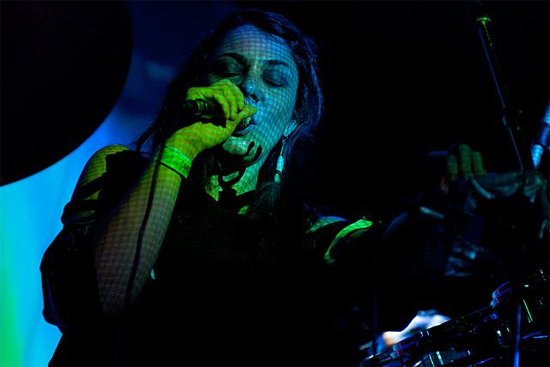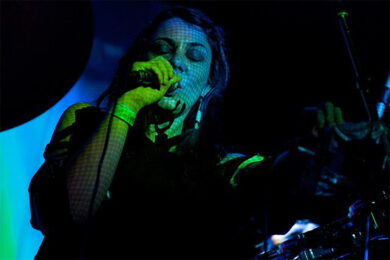"Utrecht – home of outstanding festivals," so says the city’s Mayor in the intro to Le Guess Who’s festival guide. "With the the shining of its urbane, cosmopolitan light…" oh man "this music festival reflects the intimacy of our old city’s youthful soul…" keep going, "in the darkest time of the year." Jesus. I came to Le Guess Who to review the music and to scratch a political itch with a journalistic claw, viz. city infrastructures contributing little or nothing to, but gaining much from, its music festivals. Cultural, political and low income communities create a cultural gravity, which is then harnessed and amplified by megaliths of capital to draw a tide of dollars, dickheads and dilettantes that wash out the founding communities. The Mayor’s painful rhetoric, motivated to co-opt the festival’s cultural cred for the city’s 2018 European Capital of Culture bid, lays bare the agenda of cultural recuperation within an hour of my arrival in the city, denying this article any investigative narrative. The council, in return, gave the festival no support. "They’ve even charged us for the advertising space in the city," Bob, LGW organiser, tells me over beer and deepfried cheese croquettes at LGW’s opening drinks. Long brown hair and beard, earth coloured clothing: Bob’s attire says Kevin-Smith-casual but his distant stare and taut facial muscles say stressed. Now in its fifth year, the festival still isn’t breaking even. Foremost, he’s a music lover not a businessman: the venues he runs are not for profit, a lot of the bands he books are subsidised by commercially successful shows. He’s trying to irrigate and cultivate Dutch music tastes the way they do tulips, and trying to foster a music community similar to ATP (his inspiration – he communicates with them to ensure their dates don’t clash).
It’s a committed team that would pursue such a Sisyphean project in a saturated festival market. Over 30 British festivals folded last year and punters increasingly outsource their summer hedonism to cheaper festivals on the continent. LGW’s impressive lineup and a €75 4 day pass means it could be just such a magnet for music nerds on a budget. But what distinguishes the festival is maybe not its affordability but the way such a substantial festival works in Utrecht’s tiny centre without overwhelming or being hermetically sealed from it. As a visitor, this is aided by LGW’s encouragement to couch surf: you interact with the community that aerates the soil that allows a festival like this to flourish. Briefly, you blend into its weave: its bars, banter and backstreets.
In the weekend’s current, I drift from bar to bar in a bathysphere of booze – blasts, beats and bleeps bubbling about me. I miss a lot of big fish like Low, Bill Callahan, Okkervil River, Pinback, Zola Jezus, Akron Family and Zomby. But I discover tiny exotica such as Dead Neanderthals, whose blast beats and baritone-sax-drone aurally slashes and burns a hangover’s toxic crop. Then Cheveau, with who the only disappointment is my own performance – that I don’t give into unhinged flailing as ‘Charlie Sheen”s chorus explodes. The festival’s line-up is so strong, the programming aesthetically coherent: float and you shall find. The nights and mornings, however, are murk: solid lineups of dubstep nouveau clouded by chemicals, caged by quiet audiences. In Britain these might be sexier, sweatier, grindier. Those in the smoking area would be breathlessly forcing their life story through mashing mouths.
My couchsurf host has a theory: that the Netherlands is the worst place to see touring bands. They overindulge thanks to the Netherlands a-little-bit-liberal drug laws, she says. Many bands this weekend are flying the Good Time Foreigner in the Netherlands flag, but flying it highest of all is Stephen Malkmus. He almost knocks his amp over as he stumbles about the stage, he slides down the wall as he solos, while the Jicks’ drummer makes sex-faces and whips his hair round like that famous girl. Their performance is loose and dynamic rather than sloppy, though; far more enjoyable than on record. I’m not buying my host’s theory. I want to see bands having a good time, it’s contagious. And I catch it bad – the evenings melt and blur.
The days feel sleepy and village-like, bars and cafes bubble softly with meetings and conversations, the beer makes a Brit’s palate sing, and the cobbled canalsides make for a soothing stroll or cycle. On the latter, you get a festival discount – four day bike rent for €20. The city centre is pedestrianised, and, beyond, there are bike lanes that almost make this jaded London cyclist break down to weep car-fume-toxic tears onto the flawless tarmac.
But this is no social idyll. City planning has a conscience that’s very much for sale. My claw finally catches on a thread: almost every Utrecht music venue, including Oudegracht, its biggest, was originally squatted. There are no venues sponsored by corporations, no national or international chains. The organs of Utrecht’s music scene were secured by squatters, its blood pumped by DIY acts and promoters. These places have a history beginning in the 70s, some have only become official concert premises in the last few years. Tivoli Oudegracht will close in the foreseeable future and be re-opened in the uber-concerthall being built near the train station. It’s a council development and no one seems to know the conditions of relocation. The rumour circulating the music scene is that most of the city’s venues are to be rehoused in the new complex. The ‘youthful soul’ whose passion built the city’s music culture is to be co-opted for the Capital of Culture bid, then kept in a centrally located, sanitised box. There’s more: in October 2010, the Dutch government criminalised squatting, the sentence being up to two years custodial. Every month, a list of squats is posted by the police, and are all evicted in a single day. In Utrecht some of the more established squats remain for the time being, the enormous Ubica, for example, which looms boldly at the council buildings across a square. The law, however, is a strain on the squatting community, precludes its growth and the development of a resultant arts and politics scene not dependent on profit or power.
Let me reiterate: Utrecht’s music scene, in its entirety, developed from the 70s squatting movement. Now that Dutch cities are more prosperous (for some) and populated, the government is gutting this community in the name of economic order, but is really committing cultural seppuku at the alter of property and profit. Yet more: currently waiting in a filing cabinet in the British House of Lords in an amendment to criminalise squatting in residential properties in Britain. They’re going Dutch. The British music scene has long been saturated with unaccountable corporate ownership, shit beer and belligerent bouncers, but this amendment threatens to jeopordise the practice that gives the scene beds of germination and its few safe havens, from hardcore nights to grime raves (squatting does a lot more positive stuff besides this, primarily housing for low income workers and the homeless).
That all this was founded by what in Britain is a sub-culture is not immediately obvious. The music scene here does not feel stratified; my eyes grope for prejudices among the fashions and find no hold; no one seems aloof. By the final night, I’ve even gathered an international crew of friends who manage to mollify Sunday’s psychologically crushing hangover. Then Gang Gang Dance, my year’s musical highlight, begin jamming and rebuild my psyche as something lighter, something brighter, a rocket packed with joy. It ignites and soars with ‘Adult Goth”s chorus. GGD are a full sensory spectacle: the warped Asian-style vocals, primeval percussion and fuzzy bass grooves; the projections of spinning psychedelia and black spiky jelly-paint shivering and swelling on the rear wall. This seems to segue seamlessly into Panda Bear, who Live and Loud evokes euphoria, rather than the melancholy I get from his records. A second man tweaks a dinnertable of synths while Noah stands motionless, rapt in his percussive guitar and harmonized-vocal-wall. Both are painted with the flickering pixels of trippy visuals. The beats are more prominent than on record, giving the feeling of Technicolor techno played in a cathedral of ecstatic chorus. As final song ‘Bros’, tonight’s only tune not from Tomboy, fades out, I’m left with a feeling of communal reverence I assume one gets from evangelical song, a feeling of being wrapped in feather-light fog, protected by concentric circles of earnest people.
We decamp to a bar whose beer menu is the size of my bedroom wall. The rich scent of cheese toasties permeates the room, empties my pocket then fills my stomach. I stand next to one of my hosts. We stare at a wall, saying nothing, beer in hand. I’m thinking that with beer and weed this good and cheap, selling toasties in bars is gastronomic entrapment. I’m thinking that communities like these need to be fortified and fought for. I’m thinking that tomorrow I’ll be back in London traffic, its musical distractions costing me borough-long journeys and a wedge of weekly wage. I keep staring at the wall.



